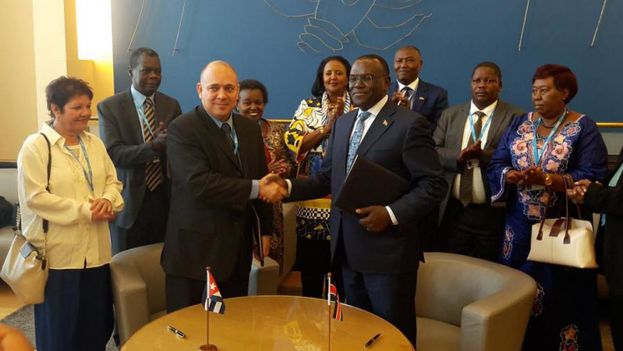
![]() EFE, via 14ymedio, Pedro Alonso, Nairobi, 6 May 2018 — Hundreds of Cuban doctors are going to cross the Caribbean Sea for the African savannah and will travel to Kenya and Uganda to strengthen their public health services, but without even boarding the plane, they already encounter the rejection of unions and medical associations.
EFE, via 14ymedio, Pedro Alonso, Nairobi, 6 May 2018 — Hundreds of Cuban doctors are going to cross the Caribbean Sea for the African savannah and will travel to Kenya and Uganda to strengthen their public health services, but without even boarding the plane, they already encounter the rejection of unions and medical associations.
Last week, Kenya and Cuba signed an agreement for one hundred Cuban doctors to come to the African country and fifty Kenyan doctors to travel to the Caribbean island to receive training, especially in the field of family medicine.
The agreement was signed after the historic visit the president of Kenya, Uhuru Kenyatta, made to Cuba in March to boost bilateral cooperation, the first of a Kenyan head of state since both countries established diplomatic relations in 2001.
The Kenyan Ministry of Health of Kenya insists that the Cuban reinforcements, scheduled for before July, will improve access in rural areas to specialized medical services in areas such as oncology, nephrology and dermatology.
In neighboring Uganda, the president, Yoweri Museveni, returned this week to defend his government’s plan to hire 200 doctors from Cuba as a buffer against the persistent threats of strike by local doctors, who have called the project “treason.”
“I want to bring Cuban doctors because our people behaved very badly and unprofessionally, they started strikes, they incited other doctors and they let our patients die, they blackmailed us,” Museveni said last Tuesday.
During a celebration of Labor Day, the veteran president, who has led Uganda since 1986, referred to the three-week strike that last November paralyzed Ugandan hospitals to demand better wages, among other demands.
“A doctor who goes on strike is not a doctor, he is an enemy of our people and we should treat him as such,” snapped Museveni, not known for mincing words.
Despite the excellent global reputation of Cuba’s “white coats,” the unions and medical associations of the two countries reject the Cuban agreements outright, arguing that they are expensive and do not offer a permanent solution to the lack of specialists.
According to the Ugandan Minister of Public Service, Wilson Muruli Mukasa, the State will pay about 1,500 dollars a month for each Cuban doctor, a salary higher than the 1,200 dollars earned by a high rank Ugandan specialist doctor.
“Uganda already has many specialists, all we want now is better salaries, better working conditions and the tools to offer those services,” demanded the president of the Uganda Medical Association (UMA), Ekwaro Obuku.
The Kenyan Union of Physicians, Pharmacists and Dentists (KMPPDU) has urged the Ministry of Health to hire the more than 2,000 Kenyan doctors, including 171 specialists, who are looking for work, before importing doctors from the Latin American country.
“The Cubans are not going to come to do something that we can not do, they are not going to contribute anything special,” said KMPPDU general secretary Ouma Oluga, who believes that the government plan is a waste of public resources.
In the opinion of gynecologist Nelly Bosire, of the Board of Doctors and Dentists of Kenya, “Cuba trains doctors for export to generate income, Kenya can not afford to buy that expensive product, which should be manufactured at home.”
Doctor Bosire is not mistaken, because the sale of medical services is one of the main sources of income of Cuba, which in 2016 had doctors deployed in more than sixty countries, according to official data.
In contrast to some of the detractors, some voices advocate opening the doors of Kenyan and Ugandan hospitals to Cuban doctors, including the Kenyan entrepreneur Njoroge Mbugua, who received medical attention in CUba.
“On February 2, I started my medical treatment in Cuba and in the last seven weeks I have achieved more than in the two years I was hospitalized,” writes Mbugua in an article published on 8 April in the main Kenyan newspaper, Daily Nation.
In his “letter from the bed of a Cuban hospital,” the businessman relates that he spent a year in a hospital in Kenya and eleven months in centers in India and Dubai in search of a cure for his illness, until he arrived in Cuba, where he found “the end of the road” for his sorrows.
And, without the least bit of doubt, Mbugua sends a message to the Kenyan authorities: “Bring Cuban doctors.”
________________________
The 14ymedio team is committed to serious journalism that reflects the reality of deep Cuba. Thank you for joining us on this long road. We invite you to continue supporting us, but this time by becoming a member of 14ymedio. Together we can continue to transform journalism in Cuba.
